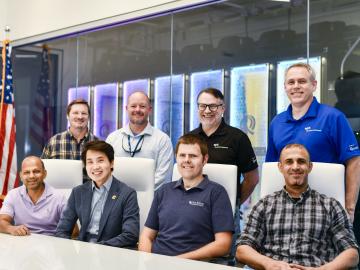
Filter News
Area of Research
- Advanced Manufacturing (2)
- Biology and Environment (9)
- Computational Biology (1)
- Energy Science (14)
- Fusion and Fission (2)
- Isotopes (17)
- Materials (35)
- Materials for Computing (2)
- National Security (11)
- Neutron Science (55)
- Nuclear Science and Technology (4)
- Quantum information Science (4)
- Supercomputing (25)
News Type
News Topics
- (-) Cybersecurity (14)
- (-) Isotopes (33)
- (-) Microscopy (23)
- (-) Neutron Science (82)
- (-) Partnerships (36)
- (-) Physics (34)
- (-) Polymers (9)
- (-) Quantum Science (48)
- (-) Space Exploration (13)
- 3-D Printing/Advanced Manufacturing (56)
- Advanced Reactors (12)
- Artificial Intelligence (77)
- Big Data (45)
- Bioenergy (68)
- Biology (80)
- Biomedical (42)
- Biotechnology (25)
- Buildings (30)
- Chemical Sciences (35)
- Clean Water (16)
- Composites (11)
- Computer Science (111)
- Coronavirus (19)
- Critical Materials (5)
- Education (2)
- Emergency (3)
- Energy Storage (32)
- Environment (116)
- Exascale Computing (51)
- Fossil Energy (6)
- Frontier (44)
- Fusion (38)
- Grid (32)
- High-Performance Computing (81)
- Hydropower (6)
- ITER (4)
- Machine Learning (37)
- Materials (51)
- Materials Science (55)
- Mathematics (8)
- Mercury (7)
- Microelectronics (3)
- Molten Salt (2)
- Nanotechnology (17)
- National Security (60)
- Nuclear Energy (66)
- Quantum Computing (35)
- Security (16)
- Simulation (42)
- Software (1)
- Statistics (2)
- Summit (40)
- Transportation (30)
Media Contacts

Researchers led by the University of Melbourne, Australia, have been nominated for the Association for Computing Machinery’s 2024 Gordon Bell Prize in supercomputing for conducting a quantum molecular dynamics simulation 1,000 times greater in size and speed than any previous simulation of its kind.
Researchers from ORNL have taken a major step forward in using quantum mechanics to enhance sensing devices, a new advancement that could be used in a wide range of areas, including materials characterization, improved imaging and biological and medical applications.

Biochemist David Baker — just announced as a recipient of the Nobel Prize for Chemistry — turned to the High Flux Isotope Reactor (HFIR) at Oak Ridge National Laboratory for information he couldn’t get anywhere else. HFIR is the strongest reactor-based neutron source in the United States.

Jordan Cannon is CEO of Circular Biosciences, a Cohort 2024 Innovation Crossroads company, a startup dedicated to accelerating bioplastic degradation for more widespread use, easier disposal and reduced environmental impact.

Entrepreneurs, city leaders and community members gathered Oct. 1 at the Mill and Mine in downtown Knoxville for Startup Day 2024, the flagship event of Innov865 Week. Innov865 highlights the efforts of the Innov865 Alliance to develop, support and promote innovation and entrepreneurship in the Knoxville region.

Scientists at ORNL used neutrons to end a decades-long debate about an enzyme cancer uses.

ORNL's Spallation Neutron Source, the nation’s leading source of pulsed neutron beams for research, was recently restarted after nine months of upgrade work.

Distinguished materials scientist Takeshi Egami has spent his career revealing the complex atomic structure of metallic glass and other liquids — sometimes sharing theories with initially resistant minds in the scientific community.

For the first time, ORNL will run equipment developed at its research facilities on a commercially available quantum network at EPB Quantum Network powered by Qubitekk to help validate the technology's commercial viability.
After retiring from Y-12, Scott Abston joined the Isotope Science and Engineering Directorate to support isotope production and work with his former manager. He now leads a team maintaining critical equipment for medical and space applications. Abston finds fulfillment in mentoring his team and is pleased with his decision to continue working.


